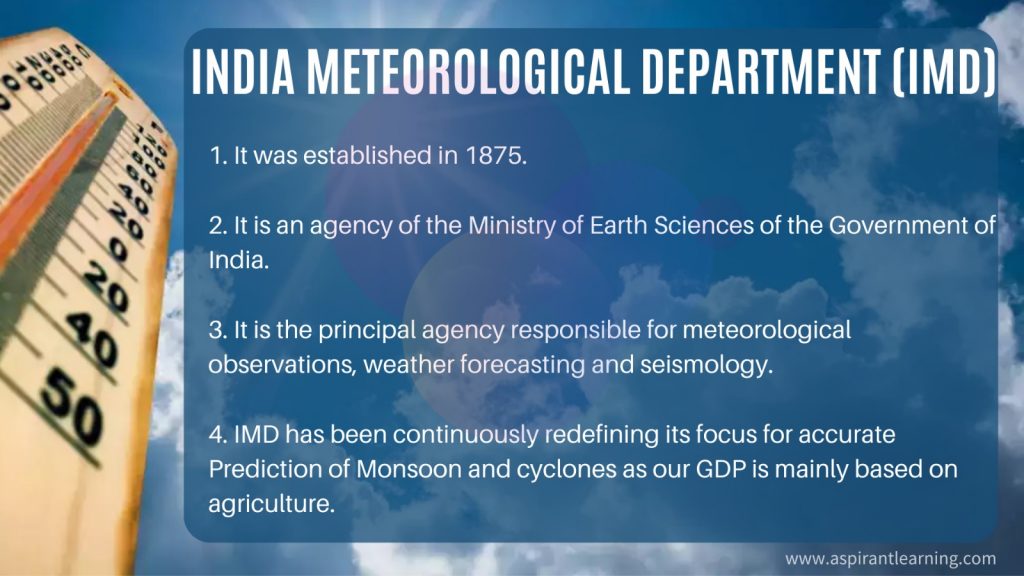News Highlights:
- Heat waves in India: The India Meteorological Department (IMD) issued a warning that the maximum temperatures in the week of February 21 will be 3-5° C higher than the long-term average over northwest, west, and central India.
- On February 21, the national capital recorded its third hottest February day (33.6° C) in more than five decades.
Key takeaway:
- The IMD defines a heat wave as an area when the ambient temperature exceeds the long-term average by at least 4.5–6.4°C.
- A heat wave is also declared when high temperatures reach 45 °C (or 37 °C in a hill station).

Origin of heat waves in India:
- Middle East warm air:
- In the spring, air usually enters India from the west-northwest.
- This direction is bad news for India for several reasons.
- In the context of climate change, the Middle East is warming faster than other regions in latitudes similarly close to the equator and serves as a source of the warm air that blows into India.
- India on the Leeward side:
- Air flowing in from the northwest rolls in over the mountains of Afghanistan and Pakistan, so some of the compression also happens on the leeward side of these mountains, entering India with a bristling warmth.
- Warmer Arabian sea:
- The air flowing over the oceans is expected to bring cooler air since land warms faster than the oceans (because the heat capacity of the land is much lower).
- Alas, the Arabian Sea is warming faster than most other ocean regions.
- Upper atmospheric westerly winds:
- The strong upper atmospheric westerly winds from the Atlantic Ocean over to India during spring control the near-surface winds.
- Any time winds flow from the west to the east, we need to remember that the winds are blowing faster than the planet, which also rotates from west to east.
- The energy to run past the earth near the surface, against the surface friction, can only come from above.
- This descending air compresses and warms up to generate some heat waves.
- Global warming:
- Finally, the so-called lapse rate – the rate at which temperatures cool from the surface to the upper atmosphere – is declining under global warming.
- In other words, global warming tends to warm the upper atmosphere faster than the air near the surface.
- This, in turn, means that the sinking air is warmer due to global warming and thus produces heat waves as it sinks and compresses.
Heatwave:
- About:
- A heat wave, or heatwave, is a period of excessively hot weather, which may be accompanied by high humidity, especially in oceanic climate countries.
- While definitions vary, a heat wave is usually measured relative to the usual climate in the area and relative to normal temperatures for the season.
- Temperatures that people from a hotter climate consider normal can be called a heat wave in a cooler area if they are outside the normal climate pattern for that area.
- IMD criteria for Heat Waves:
- According to the IMD, a heat wave occurs when the local temperature rises by at least 4.5°C to 6.4°C over the long-term average.
- The IMD says a heatwave is considered when a station’s maximum temperature reaches at least 40 degrees Celsius or more for plains, 37 degrees Celsius or more for coastal regions, and at least 30 degrees Celsius or more for hilly regions
Effects of Extreme Heat Conditions:
- Health Risk:
- One of the most significant health risks in a heatwave such as this one is heatstroke.
- Heatstroke can lead to many severe problems, including brain, heart, muscles and internal organs damage.
- Older people are more susceptible to heatstroke, as the body’s ability to regulate heat deteriorates with age.
- Forest:
- Hotter weather saps moisture from vegetation, turning it into dry fuel that helps fires to spread.
- Results In Forest Fire.
- Agriculture:
- It can also severely impact agriculture.
- It either causes vegetables to wilt and die or encourages the spread of plant diseases.
- It can result in dry agri fodder fires.
- Ecological:
- The severe heat waves reduce forest cover.
- Heat waves result in the deterioration of Fauna and Flora.
- Infrastructure:
- It affects infrastructure, too, by straining power grids and causing blackouts.
- It can ground planes, melt roads and cause the inside of vehicles to overheat to dangerous levels.
Heatwave mitigations:
- Public Awareness and Early Warning Systems:
- Disseminating public awareness through print, electronic and social media, providing heat-proof shelter facilities in heatwave-prone areas during summer, easing access to public drinking water, and afforestation programmes in urban and rural areas would help mitigate heat wave fatalities.
- Implementing Climate Action Plans
- The National Action Plan for Climate Change (NAPCC) should be implemented in true spirit for inclusive growth and ecological sustainability.
- Recognition of Heat Waves as a Natural Disaster
- Declaring heat waves as a natural disaster would help the state and district administration prepare a heatwave action plan at the regional level.
- Sustainable Cooling
- Passive cooling technology, a widely-used strategy to create naturally ventilated buildings, can be a vital alternative for residential and commercial buildings to address the urban heat island.
- Climate-Resilient Crops
- A dynamic understanding of risks is needed to evaluate whether the crops we have relied on so far will also be the ones to provide food and nutrition security in future.
Pic Courtesy: Freepik
Content Source: The Hindu



